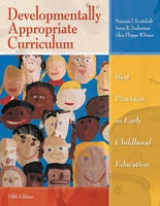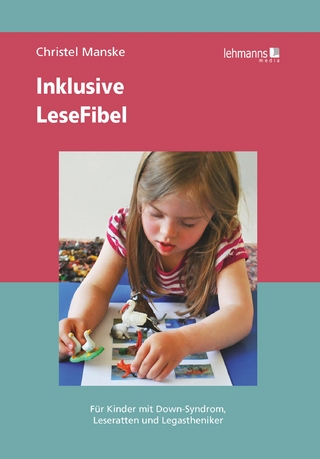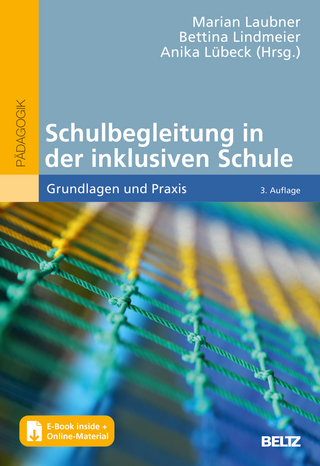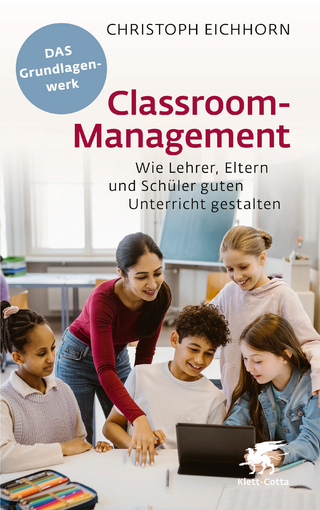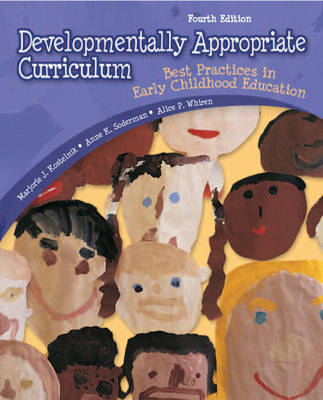
Developmentally Appropriate Curriculum
Pearson (Verlag)
978-0-13-239093-4 (ISBN)
- Titel erscheint in neuer Auflage
- Artikel merken
This best-selling text has been thoroughly updated to include standards coverage and address all aspects of classroom life, including the roles of children and adults, the physical and social environments, and teaching and learning within multiple domains for children age three to eight. It provides a comprehensive, cohesive approach to curriculum development which results in greater continuity for children and practitioners in such formal group settings as childcare, pre-school, and the early elementary grades. Concentrating as much on the “how” of curriculum development as on the “what and why,” the authors present numerous examples and practical, research-based guidelines–organized by developmental domain–for translating theory into best practice that accommodates age-appropriateness, individual differences, and social and cultural diversity. Readers learn how to conceptualize, plan, implement, and evaluate curriculum through detailed application opportunities in each chapter.
Marjorie J. Kostelnik, Ph.D., is Dean of the College of Education and Human Sciences at the University of Nebraska, Lincoln. A former child care, Head Start, and nursery school teacher, as well as elementary school specialist, Dr. Kostelnik has been actively involved in helping educators in early childhood programs explore the implications of developmentally appropriate practices. Her work has taken her to many settings throughout the United States and abroad. Marjorie teaches classes in early childhood inclusive education and is currently on the Coordinating Commission for High Quality Early Childhood Education for the State of Nebraska. Anne K. Soderman has had 14 years of classroom experience working with children in both public and nonpublic educational settings prior to joining Michigan State University, where she is currently Professor of Family and Child Ecology. In addition to carrying out teaching assignments in a number of international settings, she consults with public school systems in early childhood curriculum, instruction, and evaluation, with a particular focus on early literacy for children who are at risk. She has also recently co-authoredScaffolding Emergent Literacy (2005) andCreating Literacy-Rich Preschools and Kindergartens (2006). Alice Phipps Whiren is a professor in the Department of Family and Child Ecology, Michigan State University. She teaches curriculum in early childhood and child development to undergraduate and graduate students. Early in her career, she taught young children in an inner-city public school in Michigan. She also served as a Head Start assistant director and has provided a variety of training sessions for preprimary teachers nationally and internationally. Most recently, she has been a consultant to public school systems as their staffs implement more developmentally appropriate programs for children. Contributors Barbara Rohde began her professional career as an art teacher, and recently retired after three decades as an early childhood teacher and administrator. Barb taught young children and college students in public schools, cooperative preschools, at Michigan State University and Lansing Community College. She organized programs and worked with teachers in elementary schools, childcare, School Readiness, Even Start and Early Head Start in Michigan. Barb is currently enjoying success as an artist in Durham, North Carolina. Laura C. Stein, a former head teacher of the child development laboratories at Michigan State University, is an early childhood consultant living in East Lansing, Michigan. For the past 25 years, she has worked with college students as well as 4- and 5-year-old children. She is a coauthor of a textbook on children’s social development, has contributed numerous chapters and articles to books and journals, and speaks extensively to professional audiences. Michelle Rupiper serves as the director of the Ruth Staples Child Development Laboratory at the University of Nebraska, Lincoln (UNL). Having received her doctorate in Special Education from Teachers College at UNL, Michelle has had 25 years of experience working with children and families in a variety of early childhood programs. She is the current president of the Nebraska Association for the Education of Young Children.
Introduction.
I. FOUNDATIONS OF EARLY CHILDHOOD EDUCATION.
1. Developmentally Appropriate Practice: An Evolving Framework for Teaching Young Children.
2. Teaching and Learning in Developmentally Appropriate Programs.
II. SETTING THE STAGE FOR LEARNING.
3. Planning and Implementing Effective Small-Group Activities.
4. Planning and Implementing Effective Whole-Group Activities.
5. Organizing Space, Materials, Time.
6. Child Guidance in Early Childhood Classrooms.
7. Evaluating and Guiding Children's Progress by Using Authentic Assessment.
8. Strengthening Developmentally Appropriate Programs Through Family Involvement.
III. THE CURRICULUM.
9. The Aesthetic Domain.
10. The Affective Domain.
11. The Cognitive Domain.
12. The Language Domain.
13. The Physical Domain.
14. The Social Domain.
IV. INTEGRATING CURRICULUM.
15. Integrating Curriculum Through Pretend and Construction Play.
16. Integrating Curriculum by Using Themes and Projects.
Appendix A: Sample Lesson Plans.
Appendix B: Field Trips.
Appendix C: The Big, Big Turnip
References.
Name Index.
Subject Index.
| Erscheint lt. Verlag | 4.10.2006 |
|---|---|
| Sprache | englisch |
| Maße | 210 x 276 mm |
| Gewicht | 943 g |
| Themenwelt | Sozialwissenschaften ► Pädagogik ► Schulpädagogik / Grundschule |
| ISBN-10 | 0-13-239093-0 / 0132390930 |
| ISBN-13 | 978-0-13-239093-4 / 9780132390934 |
| Zustand | Neuware |
| Informationen gemäß Produktsicherheitsverordnung (GPSR) | |
| Haben Sie eine Frage zum Produkt? |
aus dem Bereich
